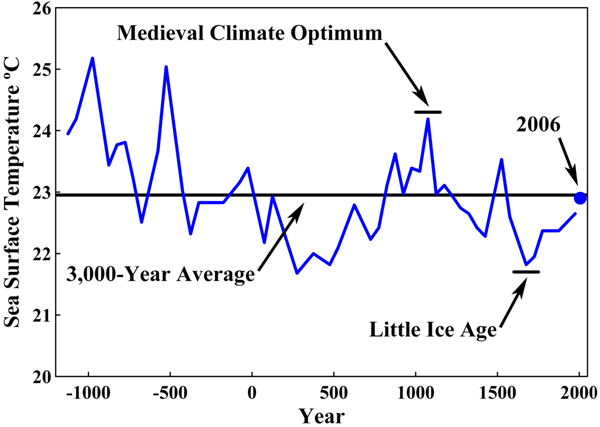
Hurricanes Versus Climate Change Update
by Lewis Loflin
Update October 2017: after 12 years of frustration of environmentalists at the lack of hurricanes finally got what they wanted 12 years later - and the hysteria is full blown.
One of the big scares of man-made global warming dogmatists was the increase in super hurricanes. they thought they had it made after Katrina wrecked New Orleans. Their computer model crystal balls failed again. Ryan N. Maue's 2010 Global Tropical Cyclone Activity Update notes that:
2010 is in the books: Global Tropical Cyclone Accumulated Cyclone Energy [ACE] remains lowest in at least three decades, and expected to decrease even further... For the calendar year 2010, a total of 46 tropical cyclones of tropical storm force developed in the Northern Hemisphere, the fewest since 1977.
Of those 46, 26 attained hurricane strength (> 64 knots) and 13 became major hurricanes (> 96 knots). Even with the expected active 2010 North Atlantic hurricane season, which currently accounts on average for about 19% of global annual hurricane output, the rest of the global tropics has been historically quiet. This work may be cited as Maue (2009) or Maue and Hart (2011).
"Global TC [tropical cyclone] Activity remains at 30-year lows at least - The last 24-months of ACE [Accumulated Cyclone Energy] at 1090 represents a decrease from the previous months and a return to the levels of September 2009. Since Hurricane Katrina and the publication of Emanuel (2005) and Webster et al. (2005), global tropical cyclone ACE has collapsed in half."
On Thursday, Florida State University researcher Ryan N. Maue updated his index of tropical cyclone activity to reflect the fact that worldwide hurricane activity has reached a 33-year low. The Western North Pacific has seen tropical cyclone activity at a level 78 percent below normal, proving those seas haven't been calmer since detailed records were first kept in 1945.
If the predictions fail, let's go back and fiddle with the models again. What about hurricanes that global warming was supposed to have been causing? Published online 21 January 2010 in Nature proclaims, Most powerful hurricanes on the rise: Global warming could lead to fewer but more-intense storms. That's right, this time the lack of hurricanes is caused by global warming, but they will get us sometime in the future. To quote,
"The number of major Atlantic hurricanes per year may almost double by the end of the century in response to global warming, according to a new study..."That result, based on a simulation of Atlantic hurricane activity in a warming world, came as a surprise.
Seeking an explanation, the team hypothesized that the western Atlantic Ocean might become less favorable for storms if rising sea surface temperatures further south attract storms from the Gulf of Mexico and adjacent regions. However, at a resolution of about 18 kilometers, the models that the team used for their initial simulation were too coarse to resolve individual storm systems."
I don't need a damned computer simulation to predict that a big hurricane will hit somewhere in the Atlantic or Gulf of Mexico in the next 90 years. The global warming computer models might as well be video games. Let's leave the virtual world and deal with the real world. In addition to the lack of hurricanes, what about the following:
March 16, 2011: 35 Zoo Animals Freeze To Death In Northern Mexico
Thirty-five animals at a zoo in the northern Mexico state of Chihuahua have frozen to death during the region's coldest weather in six decades. ..Temperatures have dropped to 9 degrees Fahrenheit (minus 13 Celsius) in the area, the coldest weather in 60 years.
Wall Street Journal February 21, 2011
Freeze Hits Vegetables: Suppliers Scramble Following Cold in Mexico, Florida, Texas
A major freeze in Mexico earlier this month has resulted in a shortage across the U.S. of tomatoes, cucumbers, bell peppers and other produce that could last until April and lead to higher prices at the grocery store...the problem has been compounded by the fact that inclement weather has also hit other growing regions, like Florida and Texas, that would normally be able to make up for a supply interruption from Mexico. "It's extremely unusual for more than one production source...
http://www.upi.com/Business_News/2011/02/12/
MEXICO CITY, Feb. 12 (UPI) -- Mexican officials said up to 1.5 million acres of field corn has been lost to a rare winter freeze in the farm-rich state of Sinaloa. The yield loss is expected to be four million metric tons or about 16 percent of the nation's corn...
Also note that over 200 manatees in Florida died due to cold weather.
Web site Copyright Lewis Loflin, All rights reserved.
If using this material on another site, please provide a link back to my site.
- Web Master
- Tri-Cities VA-TN
- General Science
- Hobby Electronics
- US Constitution
- Christianity 101
- Religious Themes
- Fall of the Late Roman Empire
- End of the Vikings in Greenland
- Lost Colony of Roanoke Island
- Whale Fossils Show Ice Free Arctic
- Modern Humans Originate in Asia 80,000 Years Ago
- Hurricanes Versus Climate Change
- Dinosaur Extinction New Questions
- Massive Meteor Explosion Kills Stone Age America
- Mythical Flood or Meteor Strike?
- Useful Science Information on Climate Change Industry
- Climate Change Gravy Train on the Defensive
- Religion is Killing Children
- Science Proves Climate Change
- Posted 9/16/2022
- Why Do EPA Scientists Oppose Public Disclosure?
- Why Public Disclosure is a Right
- 84% of Americans Fear the Government for Good Reason
- Who are the Smartest Countries? Nobel Prizes Tell the Story
- Green Technology Highly Polluting, Environmentally Destructive
